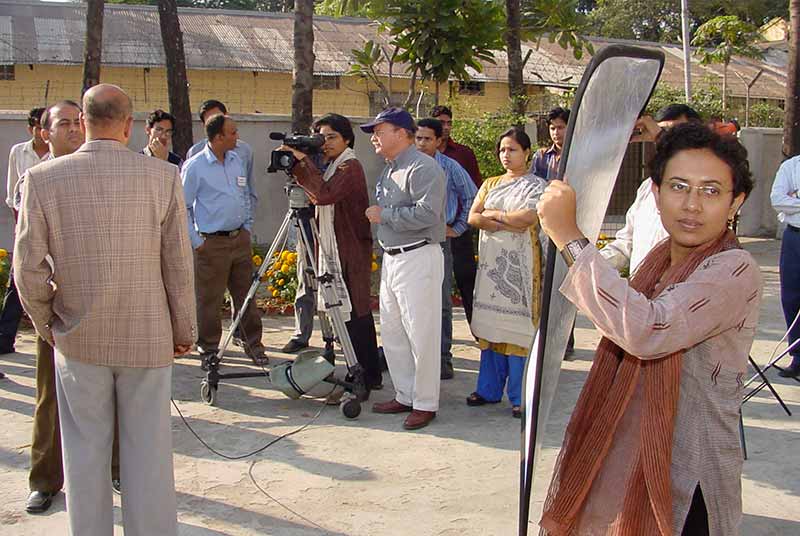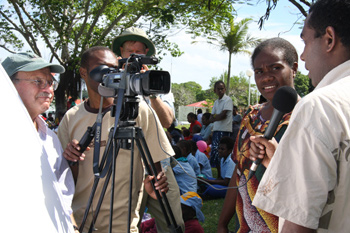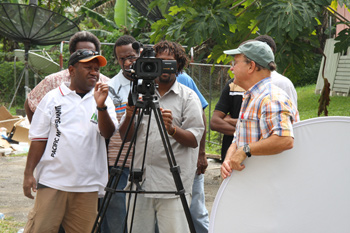By:
- Christine Clark
Published Date
By:
- Christine Clark
Share This:
To Bangladesh and Back
UC San Diego filmmaker brings years of broadcast journalism experience to classrooms around globe

Robert Hooper knows the powerful role media can play in bringing about social justice. The UC San Diego alumnus who teaches courses on international conflict and the media at the School of International Relations and Pacific Studies (IR/PS) has worked intensively in nations facing ethnic, religious and sectarian conflict. He has led workshops on media and conflict resolution that enable journalists to report on ethnic and sectarian conflict in South and Southeast Asia, the Middle East and Eastern Europe. He has put himself in harm’s way through his career, and he credits his ability to do so to the foundation he built at UC San Diego.
“The campus curriculum’s emphasis on taking courses in both sciences and humanities helped prepare me for the world,” Hooper said. “It’s a foundation that can help prepare today’s students for life’s unexpected directions.”
Hooper was recently awarded a two-year $1.5 million grant from the U.S. Department of State to serve as project director for “Filmmaking and TV Journalism for Peace and Tolerance in Bangladesh.” The project enables students from four universities in Bangladesh to produce original documentary films that personify peace and tolerance in Bangladesh.
He graduated from UC San Diego in 1969, earned a law degree from UC Davis in 1974 and practiced law, and later returned to UCLA to earn an MFA in film production in 1982.
In the 70’s, Hooper worked as a lawyer and helped represent farmworkers who were being poisoned by pesticides. He soon embarked on a career as a filmmaker and journalist because he found he could do more for social justice by exposing the truth through media.

“Journalists and journalism are absolutely essential for any democratic society to succeed,” Hooper said. “Even in the United States we have witnessed the failures of journalism to inform us and the country has suffered great consequences as a result.”
Hooper worked for the Environmental Protection Agency, the Public Broadcasting Service (PBS) and the Canadian Broadcasting System making documentaries to expose the threat of toxic and radioactive wastes on humans, and later produced nationally broadcast PBS programs on environmental conflicts over killer whales and gold mining in Alaska and cultural practices and issues in the Pacific islands.
Over the years, working as an investigative journalist and later as a teacher in areas of conflict, Hooper has witnessed a great deal of tragedy.
“I often speak with my students about working with people who have experienced suffering, loss and tragedy,” Hooper said. “I have personally been shaken by the suffering of children with cancer I filmed at Love Canal, dying Navajo uranium miners in New Mexico and the survivors I met in Iraq whose families had been murdered. What continues to inspire me is the opportunity to empower people, in the U.S. and abroad, to bring their stories to national and international audiences to redress grievances and help resolve conflict.”
It wasn’t until Hooper was 39 that he decided to go into academia. “By then, I possessed the skills and experience, in addition to advanced degrees in filmmaking and law, to provide students with the academic foundations matched to real world professional practice that enable success,” Hooper said. “Empowering students to tell their own stories driven by talent and passion has proven as successful at American universities as it has in Asian and Pacific nations, the Middle East and Eastern Europe.”
Hooper has witnessed firsthand the role of media in conflict resolution, terrorism and human rights and has done extensive “on the ground” research. He has served as a Fulbright Senior Scholar to Malaysia (1989), Indonesia (2001), and Fiji (1994), a 1996 Eisenhower Fellow to Malaysia and a U.S. Department of State Speaker to Iraq, Indonesia, Malaysia, Bangladesh, Laos, Papua New Guinea, Slovakia and Vanuatu. He recently served as the UC San Diego project director for “Promoting Independent and Free Media in Fiji,” a two-year grant from the Bureau of Democracy, Human Rights and Labor at the U.S. Department of State.

“The key to resolving ethnic, political and sectarian conflict in troubled nations is to work on the ground with all parties involved,” Hooper said. “There is no substitution for hands-on capacity building in nations in turmoil. To cite one example, communal conflicts between Hindus and Muslims in South Asia can lead to violence, even among professional journalists. In my workshops at the National Press Institute of Bangladesh, I assigned Muslims and Hindus to work together on news crews to cover breaking stories, in direct competition with other crews composed of Muslims and Hindus. I announced trophies to be awarded for the best stories, which encouraged competition between news teams composed of reporters of both religions. Conflicts between them quickly ceased as they competed for common goals “
Currently, at IR/PS, Hooper is teaching Filmmaking and TV Journalism for Peace and Tolerance in Bangladesh from a classroom on campus to students in Bangladesh.
In a true university-to-university distance-learning course, students have the opportunity to write, shoot and edit their own films, followed by a special screening with high-profile filmmakers and TV journalists in Bangladesh.
According to Hooper, the course is designed to capture the dynamics of the classroom that are often missing in distance education. It is a live, interactive course delivered by Internet from UC San Diego to a classroom and studio at the Independent University Bangladesh (IUB). A lecture delivered live from UC San Diego at 7 p.m. becomes a morning course in Bangladesh at 9 a.m.
“I believe this is the future of successful international education that leads to sustainable partnerships,” Hooper said. “The key is to listen closely to your colleagues in challenged nations, to work directly with them to provide the education and skills they request from you.”
Share This:
You May Also Like
Stay in the Know
Keep up with all the latest from UC San Diego. Subscribe to the newsletter today.



